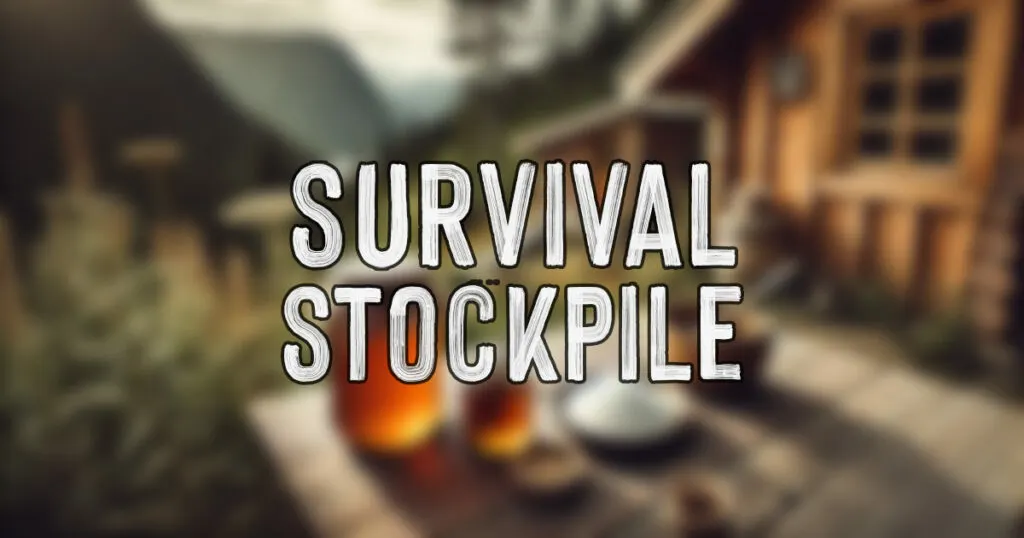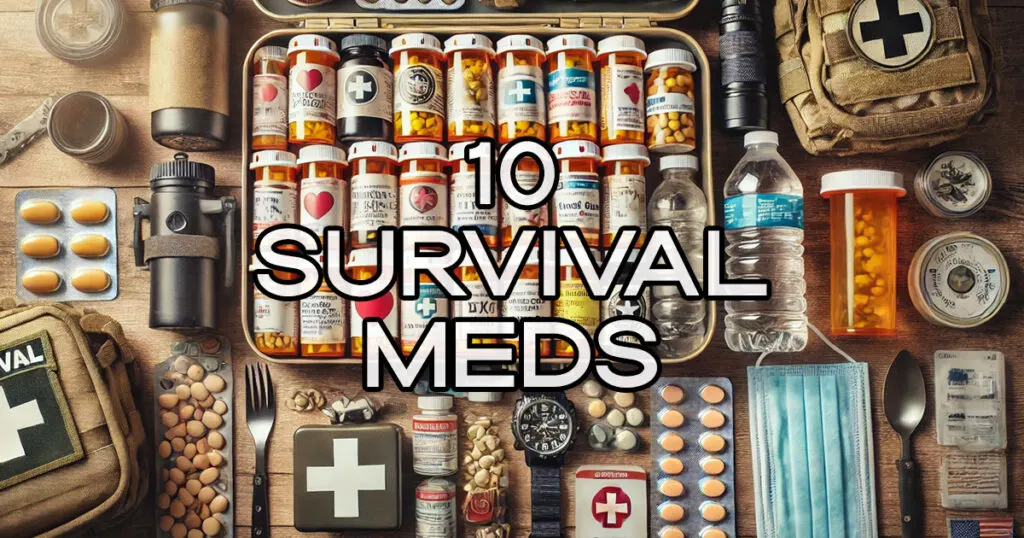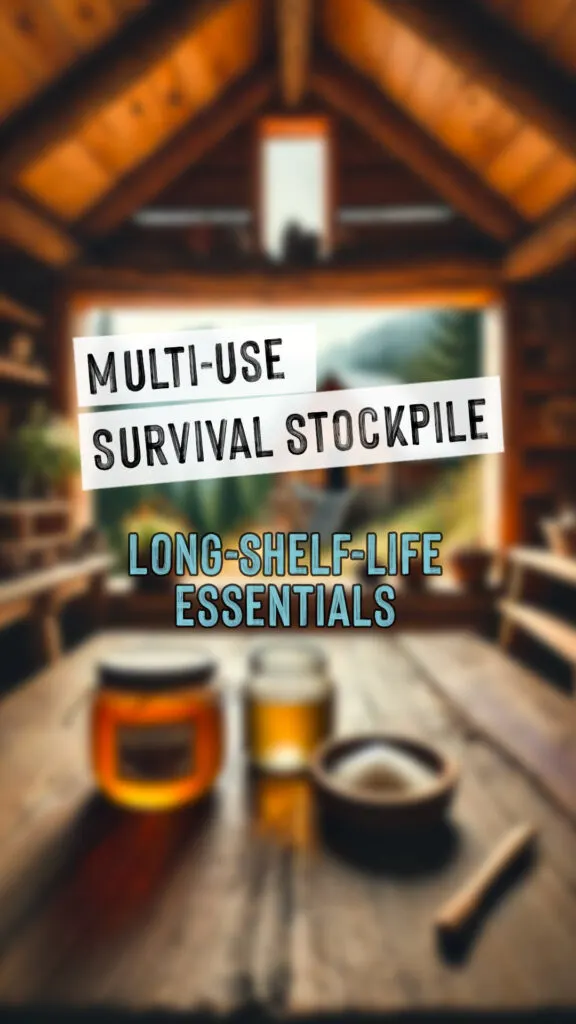In any off-grid, homesteading, or emergency preparedness scenario, having a stockpile of supplies that can serve multiple purposes and last for years, if not indefinitely, is key to long-term survival. The ability to rely on versatile, long-lasting items can reduce dependence on frequent resupplies and give you peace of mind, knowing that what you’ve stored will be there when you need it most. Whether you’re facing supply chain disruptions, natural disasters, or simply aiming for greater self-sufficiency, stocking up on the right materials ensures that you’re ready for any situation.

This list highlights the ultimate selection of multi-purpose items with long or indefinite shelf lives. These essentials cover everything from food preservation and water purification to wound care and basic hygiene, allowing you to get the most out of each item. By focusing on products that won’t expire or lose their effectiveness over time, you can build a robust stockpile that helps sustain your needs and protect your resources for years to come. Read on to discover the must-have supplies that will help you stay prepared, no matter what comes your way.
While some of these items may be consumed, this is not a list of long shelf life food items. This list is focused on multi-purpose, long-shelf-life essentials that are useful for survival, homesteading, off-grid living, and emergency preparedness. The common thread is that all items have indefinite or extended shelf life, can be stored long-term, and serve multiple survival purposes.
You can see the entire list below AND there are 2 Ways to Get the Printable PDF:
1.) You can purchase the PDF download for $5 by clicking this button:
2.) You can join our Patreon ($5/mo) and get ALL PDF downloads + answers to all your questions, click the image:

Unrefined Sea Salt (Indefinite)
- Best Storage: Store in an airtight container, such as glass or food-grade plastic, in a cool, dry place.
- If It Goes Bad: Salt doesn’t spoil, but it can absorb moisture and impurities. It won’t harm you, but it may clump and become harder to use. It remains fully effective if dried.
- Uses:
- Food preservation (curing, pickling)
- Electrolyte balance (preventing dehydration)
- Cleaning wounds (saline solutions)
- Oral rehydration solutions
- Attracting animals for hunting (salt licks)
- Treating sore throats (gargling)
Honey (Indefinite)
- Best Storage: Keep honey in a sealed glass or plastic container in a cool, dry area.
- If It Goes Bad: Honey crystallizes but remains safe to eat. Spoiled honey due to contamination (e.g., fermentation) could cause digestive issues.
- Uses:
- Antiseptic for wounds (kills bacteria)
- Energy source
- Food preservation (mix with herbs or nuts)
- Soothing sore throats and coughs
- Emergency sugar substitute
- Skin moisturizer (helps with burns and rashes)
Vinegar (Indefinite)
- Best Storage: Store in a sealed glass or plastic container in a cool, dark area.
- If It Goes Bad: Vinegar is highly stable and doesn’t spoil, but it may lose potency or develop a cloudy appearance. It remains safe to use.
- Uses:
- Cleaning and disinfecting surfaces
- Food preservation (pickling)
- Pest repellent (deters ants, fruit flies, and rodents)
- Wound cleaning (mild disinfectant)
- Water purification (in acidic environments)
- Food flavoring
Sodium Bicarbonate (Baking Soda) (Indefinite)
- Best Storage: Store in an airtight container, like a mylar bag or glass jar, in a cool, dry place.
- If It Goes Bad: Baking soda can absorb moisture and odors but won’t harm you. It may become less effective as a leavening agent or cleaner if it absorbs moisture.
- Uses:
- Fire extinguisher (smothers grease fires)
- Toothpaste
- Cleaning surfaces (natural abrasive)
- Deodorizing (neutralizes odors)
- Neutralizing stomach acid (for heartburn relief)
- Water softener (improves the cleaning power of soap)
Iodine (5+ Years)
- Best Storage: Store in an airtight, opaque container in a cool, dark place to prevent light and heat exposure.
- If It Goes Bad: Iodine loses potency over time when exposed to air and light. It won’t harm you, but its effectiveness for water purification and wound care will diminish.
- Uses:
- Water purification (kills bacteria, viruses, and protozoa)
- Disinfecting wounds
- Thyroid protection in radiation emergencies (prevents radioactive iodine absorption)
- Antiseptic for cuts and scrapes
- Treating fungal infections (e.g., athlete’s foot, ringworm)

Medications for Survival Situations: What to Stock
Activated Charcoal (Indefinite)
- Best Storage: Store in an airtight container in a cool, dry location.
- If It Goes Bad: Activated charcoal doesn’t spoil but may lose effectiveness if it absorbs moisture or contaminants. It won’t harm you, but it may lose its ability to adsorb toxins.
- Uses:
- Water filtration (removes toxins and chemicals)
- Poison absorption (in cases of poisoning or drug overdose)
- Air purification (removes odors, chemicals)
- Treating insect bites or stings (draws out toxins)
- Tooth cleaning (natural teeth whitener)
Calcium Hypochlorite (10+ Years)
- Best Storage: Store in a sealed, non-reactive container (like HDPE plastic) in a cool, dry place away from moisture and other chemicals.
- If It Goes Bad: Decomposing calcium hypochlorite releases chlorine gas, which is harmful to inhale. Store safely to prevent moisture exposure.
- Uses:
- Water purification (treats contaminated water)
- Disinfecting surfaces
- Sanitizing water containers
- Cleaning medical tools
- DIY bleach solution
Borax (Indefinite)
- Best Storage: Store in an airtight container in a dry, cool place.
- If It Goes Bad: Borax hardens if exposed to moisture but remains safe to use once dried.
- Uses:
- Laundry detergent
- Pest control (kills ants, roaches, fleas)
- Cleaning stubborn grime and stains
- Mold and mildew remover
- Water softener (improves cleaning power of soap)
Vaseline (Petroleum Jelly) (Indefinite)
- Best Storage: Store in its original sealed container or an airtight container in a cool, dark place.
- If It Goes Bad: Vaseline doesn’t spoil but may degrade in extreme heat, losing its texture or effectiveness as a moisturizer or wound barrier.
- Uses:
- Protecting wounds and burns (creates a moisture barrier)
- Fire starter (when combined with cotton balls)
- Lip balm (prevents cracked lips)
- Lubricating tools and weapons
- Chafing protection (prevents skin irritation)
Beef Tallow (1-2 Years unrefrigerated, Indefinite if frozen)
- Best Storage: Store in airtight glass jars or vacuum-sealed bags in a cool, dark place. Refrigerate or freeze for indefinite storage.
- If It Goes Bad: Tallow can go rancid if exposed to air and heat. Rancid fat may cause digestive discomfort and should be discarded if it smells or tastes off.
- Uses:
Glycerin (Indefinite)
- Best Storage: Store in a sealed container in a cool, dry place.
- If It Goes Bad: Glycerin doesn’t spoil but may absorb water if left exposed, reducing its effectiveness in some applications.
- Uses:
- Skin moisturizer (prevents dryness and irritation)
- Preservative for herbal extracts
- Wound care (soothes and promotes healing)
- Antifreeze for engines (when mixed with water)
- Base for homemade soaps and cleaning solutions
Cayenne Pepper (High Capsaicin) (4-6+ Years)
- Best Storage: Store in a vacuum-sealed bag or airtight container in a cool, dry, and dark place.
- If It Goes Bad: Cayenne pepper loses potency over time, especially if exposed to light and moisture. It won’t harm you, but it may lose flavor and medicinal value.
- Uses:
- Pain relief (for arthritis and joint pain)
- Circulation booster (improves blood flow)
- Anti-inflammatory (relieves swelling)
- Food seasoning (aids preservation)
- Pest repellent (deters rodents and insects)
- Increasing body temperature in cold conditions (thermogenesis)
Boric Acid (Indefinite)
- Best Storage: Store in an airtight container in a dry, cool place.
- If It Goes Bad: Boric acid can clump when exposed to moisture but remains effective once dried.
- Uses:
- Insecticide (kills ants, cockroaches, fleas)
- Antiseptic for minor cuts and burns
- Fungicide for plants (prevents fungal growth)
- Treating athlete’s foot and fungal infections
Creatine (10+ Years, if vacuum-sealed in Mylar)
- Best Storage: Store in a mylar bag with oxygen absorbers or vacuum-sealed in a cool, dark place.
- If It Goes Bad: Creatine can degrade into creatinine, losing effectiveness. It’s not harmful, but it won’t provide its intended benefits.
- Uses:
- Muscle energy supplement (enhances strength and endurance)
- Muscle recovery (speeds healing and reduces fatigue)
- Cognitive enhancement (improves brain function under stress)
- Hydration aid (helps retain water in muscles)
- Boosts metabolism (improves energy efficiency)
Paraffin Wax (Indefinite)
- Best Storage: Store in a cool, dry place, sealed from moisture and light.
- If It Goes Bad: Paraffin wax won’t spoil but can develop an odor over time. It remains safe to use.
- Uses:
- Candle making (provides light and heat)
- Waterproofing tools and leather
- Fire starter
- Tool and weapon lubrication
pin it


Sandy
Wednesday 16th of October 2024
Many thanks.
Rob Benson
Wednesday 16th of October 2024
Welcome!
Cathy Probert
Friday 4th of October 2024
Thank you for the information, it is very useful!!!
Rob Benson
Friday 4th of October 2024
Welcome and thanks for letting me know, I appreciate it.